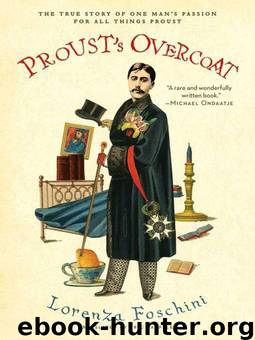Proust's Overcoat by Lorenza Foschini; Eric Karpeles

Author:Lorenza Foschini; Eric Karpeles
Language: eng
Format: mobi
Tags: Autobiography
ISBN: 9780061965678
Publisher: Ecco
Published: 2008-01-02T00:00:00+00:00
THE LETTER TO HIS GRANDFATHER.
At his house on rue Berton, Guérin was still in a reverie, surrounded by the salvaged items that had come out of the hatbox. He found most remarkable a letter dated May 1888, the same year Proust had written to Bizet proclaiming his love. Guérin smiled reading these lines, written in a young person’s steady hand. At the top right corner of a square yellow page he read:
Thursday night
My dear grandpapa, I must ask your indulgence for the sum of 13 francs. . . . This is why. In order to desist from my nasty habit of masturbation I was so desperate to see a woman that Papa gave me 10 francs to go to a brothel. But first, in my nervous state, I broke a chamber pot, 3 francs, and then, in this same agitation, I couldn’t bring myself to fuck. There I was, in for another 10 francs an hour, waiting until I could satisfy myself. . . . I wouldn’t dare ask Papa for more money so soon, and I was hoping that you would help me out in this circumstance which you know is not merely exceptional, but unique: it can’t happen twice in your life that you’re too distraught to fuck.
Proust scholar and biographer Jean-Yves Tadié remarked upon the extreme psychological pressure and deeply inculcated morality that prompted Marcel—sent by his father, as was the custom of the period, to a brothel in order to be initiated into the mysteries of sex, and there, due to his embarrassment, breaking a chamber pot—to persist so devotedly, to try so obediently to please.
Thirty years separated Guérin from Proust, but there was a social chasm that divided them even further. As an illegitimate child, Guérin had never known conventional family life. He and his brother grew up with an unusual amount of freedom, which, among other things, had allowed them to confront their issues of sexuality more freely. That had hardly been the case for Proust, who, as German critic Walter Benjamin observed, had always remained a mama’s boy. As he was to write in Sodom and Gomorrah, Proust believed that his sexual tastes made him a member of “a burdened, cursed race that must live by lying and perjury, all the while knowing one’s desires to be criminal, disgraceful, too shameful to speak of.”
Proust’s homosexuality surrounded him like an invisible and insurmountable wall. His family’s unwillingness to understand led to a history of silences that mutated into rancor. This in turn was transformed into acts of vandalism—papers destroyed, furniture abandoned. In the jumble of connections between son and parents, between brothers, between brother-in-law and sister-in-law, between uncle and niece, in the vicious turns of phrase referring to things said and things left unsaid, this invisible wall of Proust’s homosexuality was always there, intractable.
Among the papers and photographs in the hatbox, there were also a few books, and it was here that Guérin found, to his amazement, the answer to a question he had asked Robert Proust six years earlier in his office.
Download
This site does not store any files on its server. We only index and link to content provided by other sites. Please contact the content providers to delete copyright contents if any and email us, we'll remove relevant links or contents immediately.
| Actors & Entertainers | Artists, Architects & Photographers |
| Authors | Composers & Musicians |
| Dancers | Movie Directors |
| Television Performers | Theatre |
Cecilia; Or, Memoirs of an Heiress — Volume 3 by Fanny Burney(31495)
Cecilia; Or, Memoirs of an Heiress — Volume 2 by Fanny Burney(31440)
Fanny Burney by Claire Harman(26280)
We're Going to Need More Wine by Gabrielle Union(18668)
Plagued by Fire by Paul Hendrickson(17128)
All the Missing Girls by Megan Miranda(14900)
Cat's cradle by Kurt Vonnegut(14813)
Bombshells: Glamour Girls of a Lifetime by Sullivan Steve(13723)
Leonardo da Vinci by Walter Isaacson(12842)
4 3 2 1: A Novel by Paul Auster(11851)
For the Love of Europe by Rick Steves(11790)
Adultolescence by Gabbie Hanna(8615)
The remains of the day by Kazuo Ishiguro(8445)
Note to Self by Connor Franta(7472)
Diary of a Player by Brad Paisley(7286)
Giovanni's Room by James Baldwin(6848)
What Does This Button Do? by Bruce Dickinson(5947)
Born a Crime by Trevor Noah(5124)
Ego Is the Enemy by Ryan Holiday(4992)
